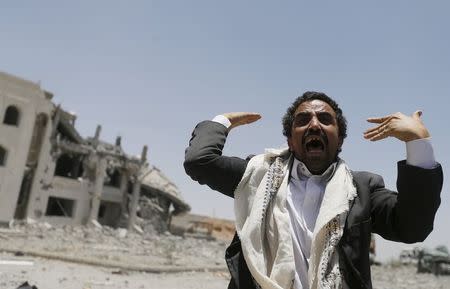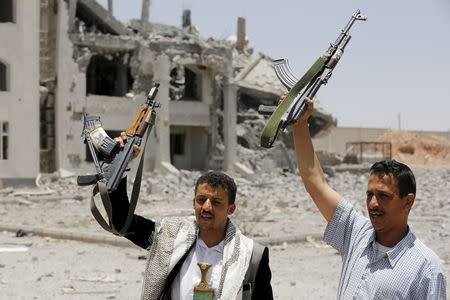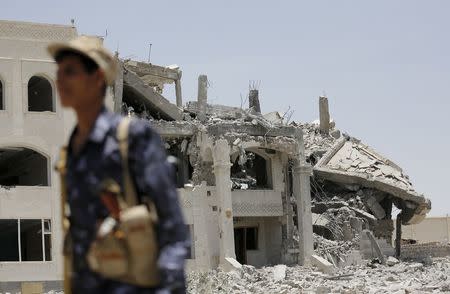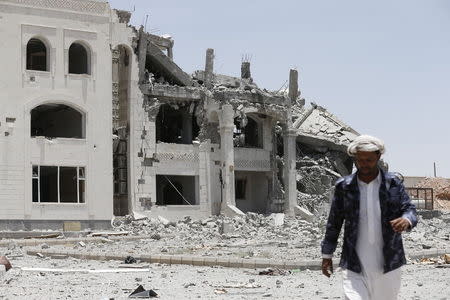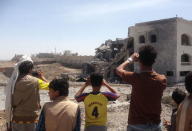Houthis, tribesmen battle in central Yemen, 15 killed
By Mohammed Ghobari CAIRO (Reuters) - Heavy fighting between Iranian-allied Houthi militia and local tribesmen killed at least 15 people in Yemen's oil-producing Marib province and an air strike targeted the home of a senior Houthi official, residents and tribal and medical sources said. Yemeni Vice President Khaled Bahah had called on the Houthis on Monday to heed a U.N. Security Council demand for an end to fighting. The conflict has pushed Yemen into a humanitarian "catastrophe", according to the Red Cross. Houthis seized the capital Sanaa last September, demanding a more inclusive government and crackdown on graft. Talks with President Abd-Rabbu Mansour Hadi collapsed and he fled into exile. Chaos set in as Houthi forces swept southwards, fighting loyalist army units, regional tribes and al Qaeda militants. Top world oil exporter Saudi Arabia, rattled by what it sees as expanding Iranian influence in the region, has been leading a Gulf Arab coalition in waging air strikes on Houthi targets since late March. Riyadh announced a halt to its campaign last week, but fighting has intensified again since Sunday. In Sanaa, airport officials said that Saudi-led warplanes had struck a civilian aircraft operated by Yemeni Felix Airways, setting it ablaze, as well as a cargo plane. The runway was also damaged in the air raid, the officials said. Earlier on Tuesday, Saudi-led jets bombed a private villa that nearby residents said belonged to Abdullah Yahya Hakim, a senior Houthi official who was among a number of officials blacklisted by the U.N. Security Council in November. There were no immediate reports of casualties from the strikes on the airport or Hakim's residence. Local residents further reported heavy clashes overnight in Marib province east of Sanaa, in the major city of Taiz in central Yemen, and in the southern port city of Aden. At least 15 people were killed in the district of Sirwah and around Marib city, the sources said, as tribesmen allied with Hadi tried to stop Houthis and troops loyal to former president Ali Abdullah Saleh from advancing on the provincial capital. The Houthis say their advance on Marib is to flush out militants belonging to al Qaeda in the Arabian Peninsula (AQAP), one of the most active branches of the Sunni Muslim militant network and an enemy of the Shi'ite Muslim Houthis. As the civil war rages on and the impoverished country sinks deeper into a humanitarian emergency, Yemenis warn that it will get ever harder to restore credible central state authority, raising the risk to nearby oil shipping lanes. VICE PRESIDENT PLEADS FOR NEGOTIATED SOLUTION The fighting has doubled the number of people displaced by the violence from the previous estimate of 150,000 on April 17, the U.N. humanitarian agency OCHA said on Tuesday. Speaking in Saudi Arabia on Monday, Vice President Bahah said Yemenis should seek a negotiated way out of the crisis based on a U.N. Security Council resolution passed in April. The Houthis have already rejected the resolution, which imposes an arms embargo on them and on Saleh's supporters, calls on them to lay down their weapons and to leave Yemen's cities. "The brothers in Ansarullah are called on to fear God ... and to stop their war on the cities," Bahah said, according to Yemeni news website www.voice-yemen.com. Ansarullah is the group's official name. Bahah is popular among many of Yemen's feuding parties, and his appointment earlier this month created some hope that a negotiated solution could be reached. In addition to bread and medical supplies running short, telecommunications could be cut within days due to fuel shortages, the state-run news agency Saba reported, quoting the director of the telecommunications authority. The United Nations children's fund, UNICEF, said on Tuesday that it had delivered urgent medical supplies for more than 500,000 people, mostly women and children, in Yemen for the next three months. A UNICEF statement said the supplies, which arrived by boat in Aden, will be used in several provinces including Aden, al-Dhalea, Lahj, Abyan and Shabwa. (Reporting by Mohammed Ghobari in Cairo and Sami Aboudi; Editing by Mark Heinrich)

